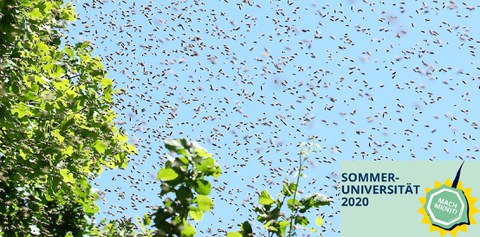Jul 29, 2020
How do proteins prevent a honey bee queen from falling to certain death? The TU Dresden Summer University provided answers.

Collage aus Sommeruni und Bienenscharm
On 27 July, science interested students had a deep-dive into molecular bee research with Dr. Anja Buttstedt, postdoc at TU Dresden’s B CUBE - Center for Molecular Bioengineering. The scientist is investigating the functions of honey bees' larval food proteins. She pays special attention to the so-called Gelée Royale, the food of the honey bee queens, which has very special molecular characteristics – vividly illustrated during this year’s TU Dresden online summer university.
Afterwards, the students were given an overview of the teaching offers of the Center for Molecular and Cellular Bioengineering (CMCB) at TU Dresden. Anne Chesneau presented the three international master's courses of the CMCB, which are conducted in English: Molecular Bioengineering, Nanobiophysics and Regenerative Biology and Medicine. Although this year’s summer university could only be performed online instead of welcoming students at the institutes, its goals were well matched: To connect pupils with TU Dresden scientists and to provide support in their choice of career and studies, especially in the MINT area (mathematics, informatics, natural sciences and technology).
